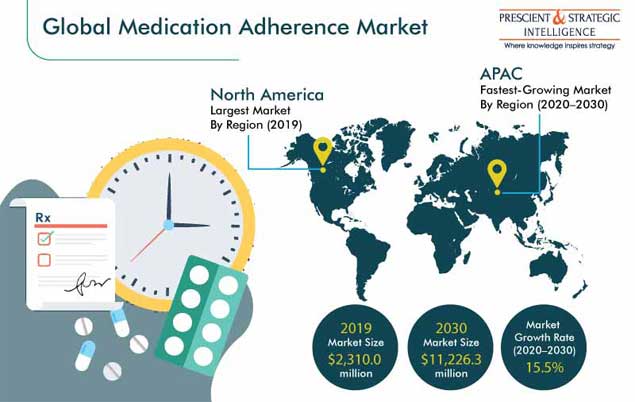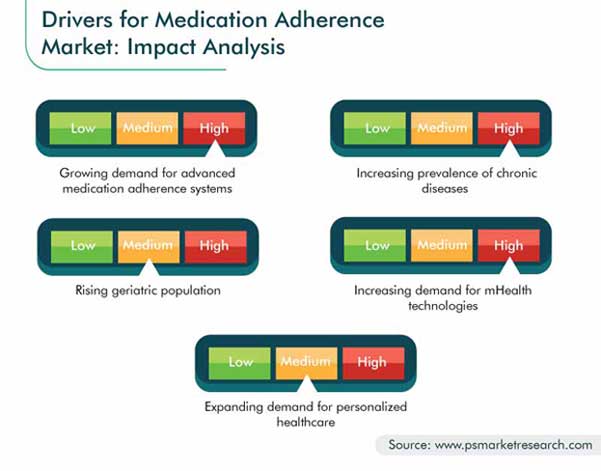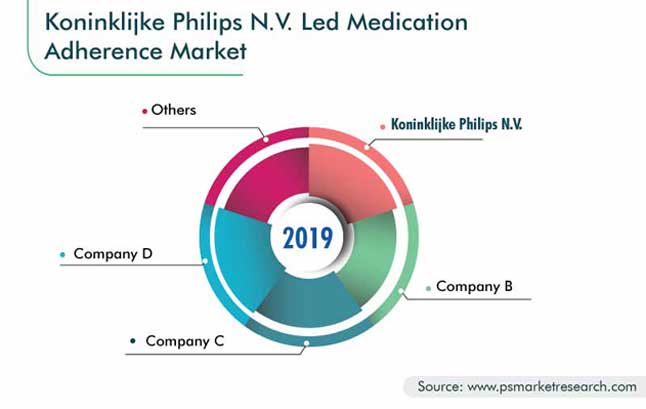Report Code: 10138 | Available Format: PDF | Pages: 303
Medication Adherence Market Research Report: By Product (Software Centric, Hardware Centric), Medication (Cardiovascular, Central Nervous System, Diabetes, Oncology, Respiratory, Gastrointestinal, Rheumatology) - Global Industry Analysis and Growth Forecast to 2030
- Report Code: 10138
- Available Format: PDF
- Pages: 303
- Report Description
- Table of Contents
- Market Segmentation
- Request Free Sample
Medication Adherence Market Overview
The global medication adherence market size was $2,310.0 million in 2019, and it is projected to reach $11,226.3 million by 2030, growing with a CAGR of 15.5% during the forecast period (2020–2030). The major factors responsible for the growth of the market are the rising demand for advanced medication adherence systems, increasing prevalence of chronic diseases, rising geriatric population, increasing demand for mHealth technologies, and surging demand for personalized healthcare.
The impact of the coronavirus (COVID-19) disease has been considered to calculate the value of the medication adherence market for the forecast period. Poor medication adherence has huge repercussions, adding about $177 billion every year to the healthcare expenditure, in the form of indirect and direct costs, but the cost of non-adherence in the times of COVID-19 pandemic has the potential to be much higher. Since medication non-adherence already accounts for 50% of the treatment failures and up to 25% of the hospitalizations each year, it has become more important than ever for physicians, pharmacists, and insurance companies to work together to keep patients adhering to their prescriptions. Such factors are driving the growth of the medication adherence industry across the globe during this COVID-19 crisis.

Software-Centric Products Held Larger Market Share in 2019
In 2019, software-centric products held the larger share in the medication adherence market. Software-centric medication adherence products are the set of programs or applications that track, record, and intimate the patient and the respective caregiver of his or her medication compliance. These products are more in demand because they have a lower cost and are more easily accessible as compared to hardware-centric products. Furthermore, with the continuous emergence of new mobile applications over the years, it is projected that mobile-app-based medication adherence products will witness the faster growth during the forecast period, as compared to other software-centric solutions.
Medication Adherence Products Are Likely To Be Largely Used for Cardiovascular Diseases
Among the various medication applications, medication adherence products were most commonly utilized for cardiovascular diseases in 2019. This category is also expected to witness the fastest growth in the medication adherence market during the forecast period, due to the rising prevalence of cardiovascular disorders, on account of the unhealthy lifestyle of the population. Diseases and conditions such as heart failure and myocardial infarction need long-term medication to reduce morbidity and mortality. The high prevalence of medication non-adherence by heart patients is resulting in a significant utilization of adherence products to ensure proper medication schedule compliance.
North America – Largest Market for Medication Adherence Solutions
Geographically, North America held the largest share in the medication adherence market during the historical period (2014–2019). The domination of the North American region on the medication adherence industry is mainly driven by the rise in research and development (R&D) spending, increasing aging population, growing healthcare expenditure, and increasing prevalence of chronic diseases. According to the Centers for Disease Control and Prevention (CDC), 7 out of the 10 major causes of death in 2019 in the U.S. were chronic illnesses. Among the various chronic diseases, heart diseases and cancer together accounted for nearly 46% of all deaths in the U.S. in 2019.
The region has been witnessing a substantial increase in its geriatric population, which has had a significant positive impact on the growth of the market in the region. According to the 2019 UN Department of Economic and Social Affairs (UNDESA) publication on the global population, Northern America is projected to witness a significant rise in its aged population till 2050, which would further drive its medication adherence market.
Asia-Pacific (APAC) Holds Lucrative Opportunities for Market Players
APAC holds lucrative opportunities for the medication adherence market players, owing to the increasing disposable income of the population, which enables them to access viable treatment options even for a high cost. Collaborations by the players aimed at launching various initiatives for encouraging innovation in the systems and software used for medication adherence are expected to drive the market in the APAC region in the future.
For instance, in 2016, Bayer AG and NUS Enterprise, the entrepreneurial division of the National University of Singapore (NUS), collaboratively launched the Grants4App program — a web-based crowdsourcing initiative. It calls for innovative health tech solutions in Singapore and across APAC to improve the adherence to prescribed drugs by the elderly population suffering from chronic diseases.
.jpg)
Rising Awareness on Medication Adherence due to Patient Saving Programs Is Key Trend in Industry
The rising awareness about medication adherence, on account of the patient saving programs being initiated, is a key trend being witnessed in the medication adherence market. Medication adherence programs aim to improve patient compliance, and they also aid pharmacists in identifying patients missing out on the timely intake of medicines. Both government and non-government organizations sponsor events and conferences across the year to educate patients and caregivers about medication adherence.

Growing Demand for Advanced Medication Adherence Systems Is Driving Industry Growth
The rising demand for advanced medication adherence systems is driving the medication adherence market growth. The healthcare ecosystem is fragmented across the globe, with the availability of a large number of decision makers for the treatment and management of an individual suffering from an illness. The lack of coordination among healthcare professionals and patients has negatively impacted the quality of care and its cost, as it leads to the fragmentation of healthcare information (e.g., diagnosis, medical history, patient demographics, billing, and administrative data). This, in turn, necessitates the use of advanced medication management and adherence platforms.
Industry also Boosted by Increasing Prevalence of Chronic Diseases
Most often, chronic diseases require prolong therapeutic intervention, such as the usage of drugs. Any interruption in the medication intake may lead to fatal consequences, thus necessitating strict medication adherence. According to the CDC, 160,201 people died in 2017 due to chronic lower respiratory diseases in the U.S. The cause of chronic diseases may vary and include genetic factors, environmental factors, and oxidative stress. Chronic diseases require clinical intervention to ameliorate them, which is attained by increasing the involvement of patient-centric medication adherence programs, thereby driving the growth of the medication adherence market.
| Report Attribute | Details |
Historical Years |
2014-2019 |
Forecast Years |
2020-2030 |
Base Year (2019) Market Size |
$2,310.0 Million |
Forecast Period CAGR |
15.5% |
Report Coverage |
Market Trends, Revenue Estimation and Forecast, Segmentation Analysis, Regional and Country Breakdown, Company Share Analysis, Companies’ Strategic Developments, Product Benchmarking, Company Profiling |
Market Size by Segments |
Product, Medication, Geography |
Market Size of Geographies |
U.S., Canada, Germany, France, Italy, U.K., Spain, Japan, China, India, Australia, South Korea, Brazil, Mexico, Saudi Arabia, South Africa |
Secondary Sources and References (Partial List) |
American Heart Association (AHA), American Medical Association (AMA), American Psychiatric Association, American Society of Health-System Pharmacists (ASHP), European Association of Hospital Pharmacists (EAHP), European Forum for Primary Care (EFPC), European Health Management Association (EHMA), Healthcare Federation of India, Japan Medical Association (JMA), Mobile Healthcare Association |
Explore more about this report - Request free sample
Expanding Demand for Personalized Healthcare Is Positively Impacting Industry
The expanding demand for advanced applications of medication adherence due to the rising adoption of personalized healthcare technologies, plays a pivotal role in the growth of the medication adherence market. Electronic health records enriched with data provided by medication adherence systems help in building models of a patient’s health profile, thereby delivering treatment plans specific to the individual. Further, personalized healthcare not only improves the quality of care, but also reduces the cost of the treatment. In addition, personalized healthcare systems are gaining popularity in homecare facilities, which further improves the overall disease management and reduces the incidents of non-adherence.
Industry Players Are Raising Funds to Expand Their Business
The global medication adherence market is nearly consolidated, with few companies, such as Koninklijke Philips N.V., McKesson Corporation, and Johnson & Johnson Services Inc., holding the major share of the industry.
In recent years, medication adherence industry players have raised funds in order to expand in the market. For instance:
- In September 2020, uMotif Limited, a patient-centric data capture software company, announced that it has raised around $6.4 million in the series A investment round led by existing investor AlbionVC. The funds will be used to fuel the development of its patient-centric and decentralized approach to clinical studies and enable expansion into new study types and more high-demand territories.
- In January 2019, HealthBeacon Limited announced that it has raised $12 million in the series A investment round, bringing the total investment to almost $15 million. The round was led by Oyster Capital and Elkstone Partners. The company stated that this funding would be used to launch its Smart Sharps system in the U.S. and develop its portfolio of medical adherence tools for high-value medications.
- In November 2018, AdhereTech Inc., a smart pill bottle creator, announced that it has received investment from Argentum Group, a growth equity firm which focuses on companies in the software, technology, and healthcare sectors. The company stated that the new financing would be used to increase its pharmacy and pharmaceutical partnerships and expand into more healthcare verticals.
Some of the key players included in the medication adherence market report are:
-
Koninklijke Philips N.V.
-
Qualcomm Incorporated
-
AdhereTech Inc.
-
McKesson Corporation
-
Omnicell Inc.
-
SMRxT Inc.
-
DrFirst.com Inc.
-
Cardinal Health Inc.
-
Johnson & Johnson Services Inc.
Medication Adherence Market Size Breakdown by Segment
The medication adherence market report offers comprehensive market segmentation analysis along with market estimation for the period 2014–2030.
Based on Product
- Software Centric
- Mobile apps
- Hardware Centric
- Devices
- Automated dispensing systems
- Smart pill bottles
- Electronic trays
- Packaging
- Multi dose
- Unit dose
- Devices
Based on Medication
- Cardiovascular
- Central Nervous System (CNS)
- Diabetes
- Oncology
- Respiratory
- Gastrointestinal
- Rheumatology
Geographical Analysis
- North America
- U.S.
- Canada
- Europe
- Germany
- France
- U.K.
- Italy
- Spain
- Asia-Pacific (APAC)
- Japan
- China
- India
- South Korea
- Australia
- Latin America (LATAM)
- Brazil
- Mexico
- Middle East and Africa (MEA)
- Saudi Arabia
- South Africa
The medication adherence market is expected to reach $11,226.3 million by 2030.
The medication adherence market report covers South Africa, South Korea, Saudi Arabia, India, Japan, China, Mexico, Brazil, the U.K., Italy, Spain, France, Canada, Germany, the U.S., and Australia.
Software-centric medication adherence products track, record, and intimate the patient and the respective caregiver of her/his medication compliance.
North America is the largest medication adherence industry.
The medication adherence industry report includes segmentation by medication, product, and region.
Want a report tailored exactly to your business strategy?
Request CustomizationWant an insight-rich discussion with the report author?
Speak to AnalystOur dedication to providing the most-accurate market information has earned us verification by Dun & Bradstreet (D&B). We strive for quality checking of the highest level to enable data-driven decision making for you
Our insights into the minutest levels of the markets, including the latest trends and competitive landscape, give you all the answers you need to take your business to new heights
With 24/7 research support, we ensure that the wheels of your business never stop turning. Don’t let time stand in your way. Get all your queries answered with a simple phone call or email, as and when required
We take a cautious approach to protecting your personal and confidential information. Trust is the strongest bond that connects us and our clients, and trust we build by complying with all international and domestic data protection and privacy laws
